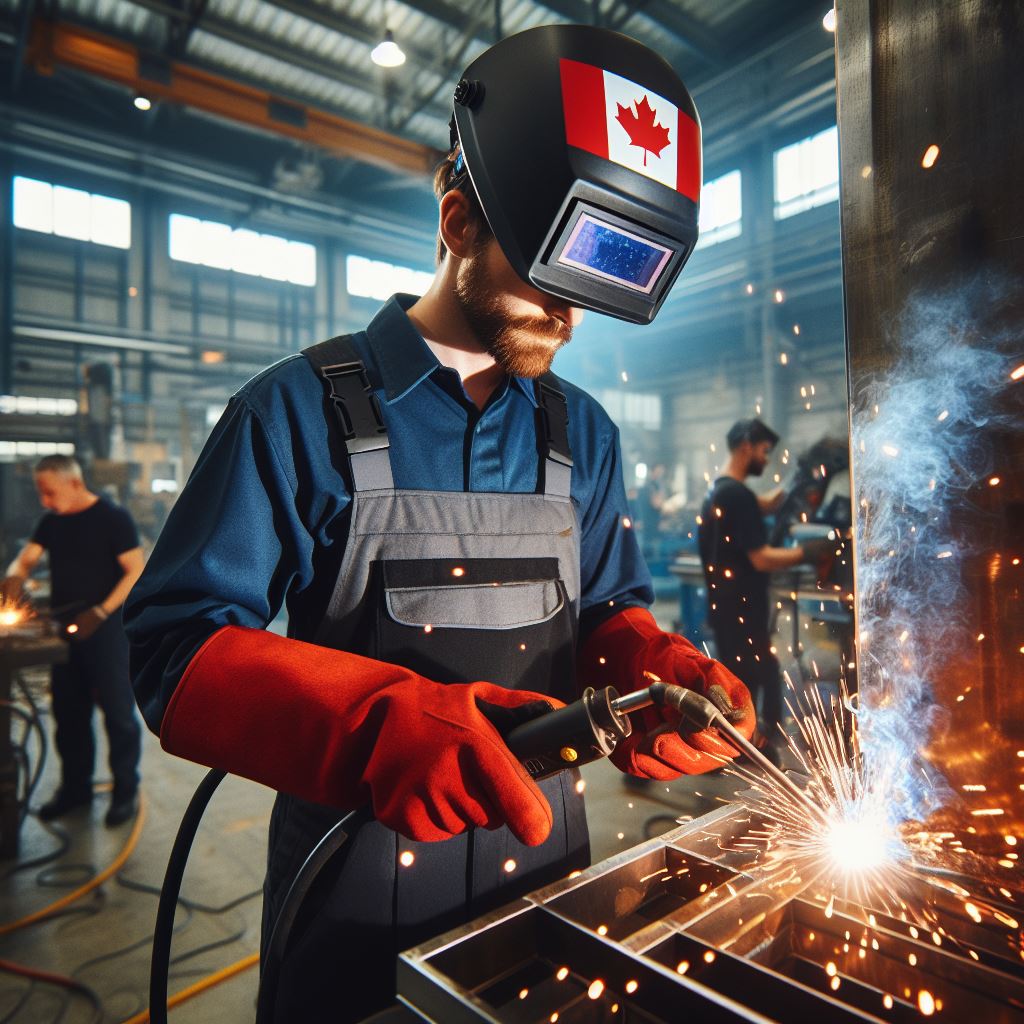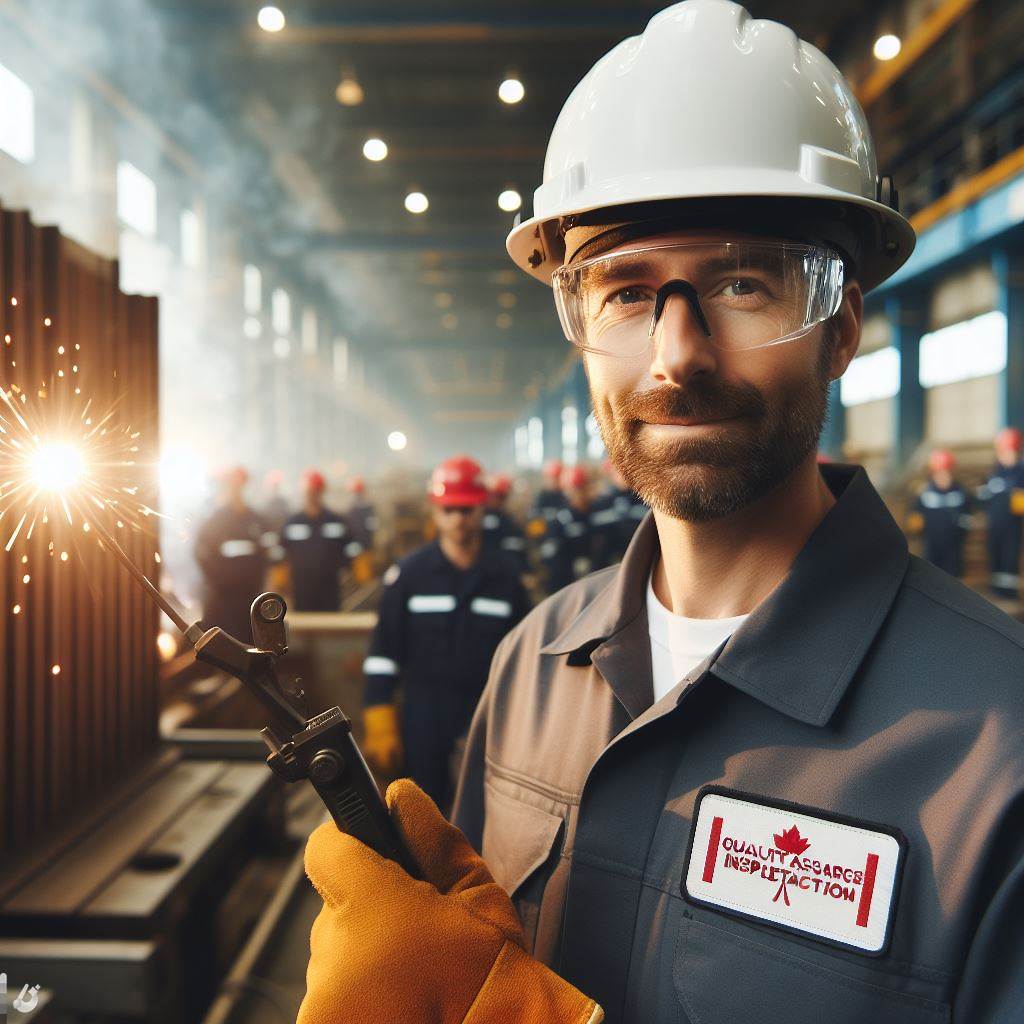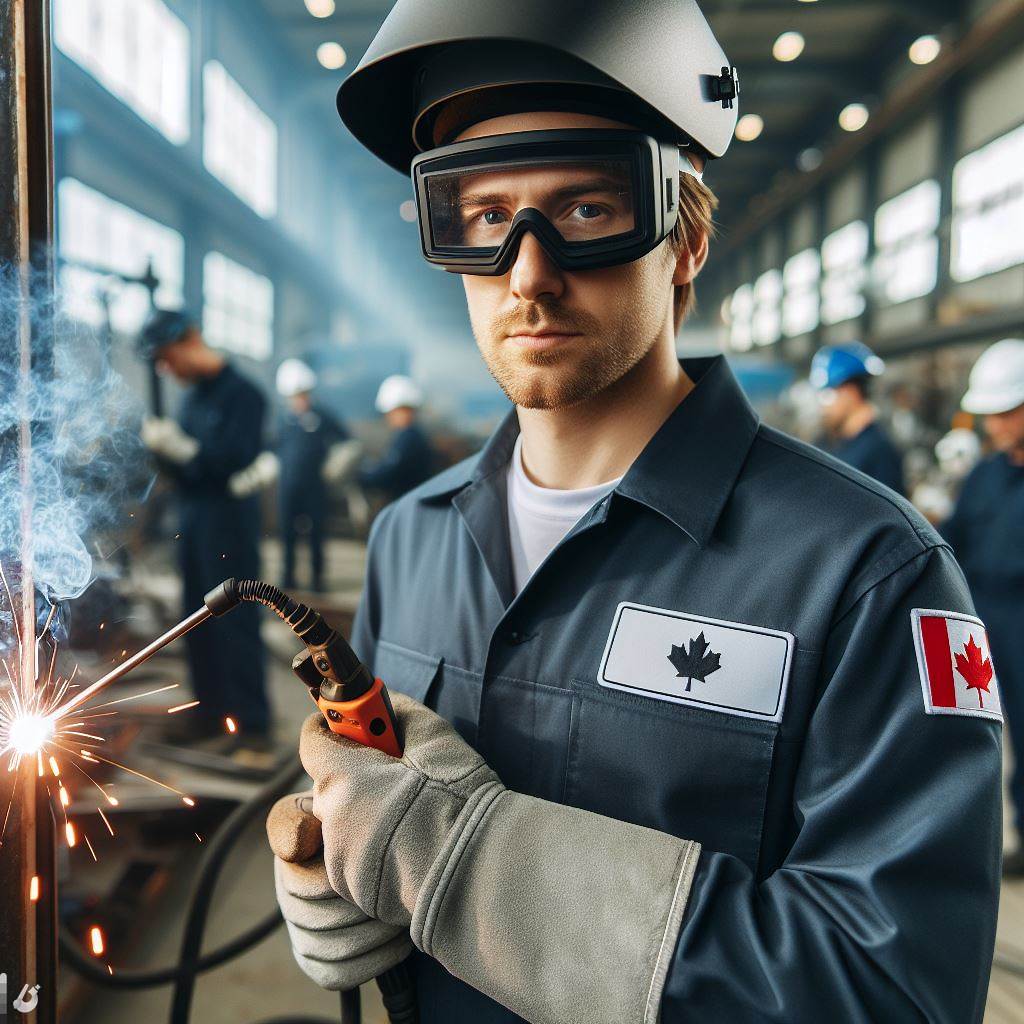Introduction
Marine welding plays a crucial role in the maritime industry, with opportunities abounding in Canada.
This blog aims to provide valuable information about the various prospects available in this field.
Marine welding is an integral part of the maritime industry, ensuring the structural integrity of vessels, offshore platforms, and other marine structures.
With a vast coastline and numerous waterways, Canada offers abundant opportunities in marine welding.
Welders skilled in working with diverse materials such as steel, aluminum, and exotic alloys are in high demand in the Canadian maritime industry.
The marine sector in Canada encompasses shipbuilding, ship repair, offshore oil and gas exploration, and renewable energy projects.
Careers in marine welding range from working in shipyards to underwater welding for repairs and maintenance.
Qualified marine welders can find employment opportunities in major coastal cities like Vancouver, Halifax, and St. John’s.
These roles involve welding hulls, pipelines, rigging systems, and other critical components of marine infrastructure.
The demand for marine welders is expected to grow due to the aging workforce and the need for skilled professionals in this sector.
Candidates can pursue certifications and training programs specifically designed for marine welding to enhance their employability.
The prospects for marine welding in Canada are vast, offering a rewarding career path for skilled welders in the maritime industry.
Overview of Marine Welding
Marine welding and its purpose in the maritime industry
Marine welding is a crucial process in the maritime industry, used to join metal parts together for various purposes, including shipbuilding and repairs.
Types of Welding Techniques Used in Marine Welding
Shielded Metal Arc Welding (SMAW)
- Also known as stick welding, it uses a flux-coated electrode to create the weld.
- Suitable for underwater welding and repairs due to its versatility and portability.
Gas Metal Arc Welding (GMAW)
- Commonly known as MIG/MAG welding, it uses a wire electrode and shielding gas.
- Offers excellent control and speed, making it suitable for high-quality welding tasks.
Flux-Cored Arc Welding (FCAW)
- Utilizes a tubular wire electrode with a flux core, eliminating the need for external shielding gas.
- Enables welding in various positions and environments, including high-strength steel and thick plates.
Submerged Arc Welding (SAW)
- Operates with a continuous wire electrode and a granular flux that completely shields the arc.
- Highly efficient for joining thick materials, such as hull plates and large structural components.
Importance of Proper Training and Certifications for Aspiring Marine Welders
Ensuring Safety
- Marine welding involves working in challenging environments, such as underwater or confined spaces.
- Proper training and certifications equip welders with essential safety knowledge and procedures.
Quality Workmanship
- Marine welding demands high-quality and precise welds to ensure the structural integrity of vessels.
- Training helps welders develop the necessary skills to achieve top-notch workmanship.
Meeting Industry Standards
- Certifications, such as those by the American Welding Society (AWS), validate a welder’s skills.
- Industries, including shipbuilding and repair, prioritize certified welders to meet regulatory requirements.
Career Opportunities
- Proper training and certifications open doors to a wide range of marine welding career options.
- Certified welders can work in shipyards, offshore oil rigs, naval bases, and other marine-related industries.
Continuous Professional Development
- Training programs and certifications provide opportunities for welders to upgrade their skills.
- Staying up-to-date with new techniques and technologies enhances employability and career growth.
In fact, marine welding plays a crucial role in shipbuilding and repairs within the maritime industry.
Understanding the various welding techniques, such as SMAW, GMAW, FCAW, and SAW, is vital for aspiring marine welders.
Unlock Your Career Potential
Visualize a clear path to success with our tailored Career Consulting service. Personalized insights in just 1-3 days.
Get StartedMoreover, obtaining proper training and certifications ensures safety, quality workmanship, and opens doors to exciting career opportunities.
Continuous professional development is essential for welders to stay relevant in the ever-evolving marine welding field.
Read: Robotic Welding: Canada’s Industrial Future
Demand for Marine Welders in Canada
The growing demand for skilled marine welders in Canada
Marine welding is a specialized skill that is in high demand in Canada’s maritime industry.
With the country’s vast coastline and thriving marine sectors, the need for skilled marine welders continues to grow.
Statistics or facts about the maritime industry’s contribution to the Canadian economy
The maritime industry in Canada is a significant contributor to the country’s economy.
According to statistics, the industry generates billions of dollars in revenue and provides thousands of jobs.
This highlights the importance of maintaining and expanding the sector.
The various sectors that require marine welders
- Shipbuilding is one of the key sectors that requires marine welders. The construction and repair of ships involve various welding techniques to ensure their structural integrity.
- Another sector that relies on marine welding is offshore oil and gas. Canada has substantial offshore resources, and welding plays a crucial role in the construction and maintenance of offshore oil platforms.
- Marine maintenance is yet another sector where marine welders are indispensable. Welding is necessary for the repair and upkeep of marine vessels, such as ships, barges, and even recreational boats.
The demand for marine welders is driven by both new construction projects and the need for ongoing maintenance and repair work.
As Canada’s maritime industry continues to grow, the demand for skilled welders is expected to increase further.
Factors that has contribute to the high demand for marine welders in Canada
Besides the overall growth of the maritime industry, several factors contribute to the high demand for marine welders in Canada.
One of these factors is the aging workforce in the welding and maritime sectors.
Many experienced welders and professionals are nearing retirement age, creating a skills gap that needs to be filled.
Advancements in technology and new welding techniques require welders to continuously update their skills and stay up-to-date with the latest industry standards.
Land Your Dream Canadian Job with a Perfect Resume
Unlock opportunities by tailoring your resume for Canadian employers. ATS-optimized and aligned with industry standards, this service boosts your chances of getting noticed and hired.
Start NowThis puts a premium on qualified marine welders who possess the necessary certifications and experience.
The demand for marine welders has also led to an increase in educational and training programs across Canada.
Many institutes now offer specialized courses in marine welding to meet the industry’s requirements.
These programs provide aspiring welders with the skills and knowledge needed to succeed in this demanding field.
Overall, the demand for marine welders in Canada is growing rapidly due to the thriving maritime industry.
Shipbuilding, offshore oil and gas, and marine maintenance are just a few sectors that rely on skilled welders to keep operations running smoothly.
As the industry continues to expand, the need for qualified marine welders will only increase.
If you are interested in pursuing a career in welding and have a passion for the marine sector, Canada provides ample opportunities for growth and development.
With the right skills, experience, and dedication, you can become a valuable asset in this essential field.
Read: Welding in the Canadian Oil and Gas Sector
Qualifications and Skills Required
The necessary qualifications and certifications required for marine welding jobs in Canada
- Valid certification in underwater welding from a recognized organization.
- Completion of a relevant welding program or apprenticeship.
- Proficiency in various welding techniques, including MIG, TIG, and stick welding.
- Ability to read and interpret blueprints, diagrams, and technical drawings.
- Good understanding of welding codes and standards, such as American Welding Society (AWS) codes.
- Physical fitness and ability to work in challenging underwater conditions.
- Strong problem-solving skills and attention to detail.
The importance of having a background in welding techniques, knowledge of materials, and safety protocols
Having a solid foundation in welding techniques is crucial for marine welders in Canada.
Different welding techniques are used depending on the materials being welded, and each technique requires specific skills and knowledge.
With a background in welding techniques, marine welders can adapt to different challenges and ensure high-quality welds.
A good understanding of materials is essential.
Elevate Your LinkedIn Profile for Canadian Success
Attract top Canadian recruiters by optimizing your LinkedIn profile. Boost your visibility with compelling keywords, a standout summary, and a professional presence that makes you unforgettable.
Get StartedMarine welders must know how different metals and alloys react under heat and pressure and how to choose the appropriate welding method and materials for each job.
This knowledge ensures the durability and integrity of welds, as well as the safety of the overall structure.
Safety protocols are of utmost importance in marine welding jobs.
Underwater welding presents unique hazards, including lack of visibility, limited mobility, and high water pressure.
Marine welders must follow strict safety guidelines to protect themselves and their colleagues.
Knowledge of safety protocols and adherence to them can prevent accidents and ensure a safe working environment.
Additional skills or experience that could be advantageous for aspiring marine welders
- Experience in working with marine equipment and structures, such as ships, submarines, and offshore platforms.
- Knowledge of marine engineering principles and systems.
- Ability to perform non-destructive testing (NDT) techniques, such as ultrasonic testing and magnetic particle inspection.
- Familiarity with underwater welding equipment, such as dry and wet welding systems.
- Strong teamwork and communication skills, as marine welding jobs often require collaboration with divers, engineers, and other professionals.
- Adaptability to changing work environments and schedules, including the ability to work in remote locations or offshore.
- Continuous learning and staying updated with the latest welding technologies and techniques.
- Certifications in first aid, confined space entry, and diving may also be advantageous.
In essence, aspiring marine welders in Canada need to possess the necessary qualifications, certifications, and expertise related to welding techniques, materials, and safety protocols.
Additional skills and experience in marine-related fields can provide a competitive edge in pursuing marine welding opportunities.
Continuous learning and staying up-to-date with industry advancements are also crucial for success in the field.
Read: The Environmental Impact of Welding in Canada

Training and Education Opportunities
Information about the various training and education options available in Canada for aspiring marine welders
When it comes to pursuing a career in marine welding, Canada offers a wide range of training and education options.
Whether you are a beginner or an experienced welder looking to specialize in the marine industry, you can find suitable programs and courses that cater to your needs and aspirations.
Technical Schools
- British Columbia Institute of Technology (BCIT) in Vancouver is renowned for its Marine Engineering programs.
- Holland College in Charlottetown, Prince Edward Island offers a Marine Training Center providing welding courses.
- New Brunswick Community College (NBCC) in Saint John has a marine welding program equipped with state-of-the-art facilities.
Community Colleges
- Georgian College in Owen Sound, Ontario provides a Marine Technology – Welding and Fabrication program.
- College of the North Atlantic in St. John’s, Newfoundland offers a Welding Engineering Technician program with a focus on marine welding.
- Nova Scotia Community College (NSCC) in Dartmouth has specialized welding courses tailored for the marine industry.
Apprenticeship Programs
- The British Columbia Apprenticeship Program allows aspiring marine welders to earn while they learn.
- Registered Apprenticeship Programs in shipbuilding and repair are offered by Nova Scotia and New Brunswick.
- Canada’s Apprentice Loan program provides financial support to apprentices attending approved training programs.
Specialized Training Programs
- The Canadian Welding Bureau (CWB) offers marine welding certifications that adhere to industry standards.
- The Canadian Institute for Non-Destructive Evaluation (CINDE) provides training programs in non-destructive testing and inspection, essential for marine welders.
- The Lloyd’s Register Welding Certification Scheme (LR) certifies welders to meet international standards in the marine domain.
By pursuing a marine welding training program at any of these institutions, aspiring welders can acquire the necessary skills and knowledge to excel in the field.
These comprehensive programs aim to prepare individuals for real-world challenges and provide them with the confidence to work in various marine settings, such as shipyards, offshore rigs, and fabrication shops.
Furthermore, the practical hands-on experience gained through apprenticeships and specialized training programs ensures that marine welders are capable of carrying out welding procedures specific to the marine industry.
From working with different materials like aluminum and stainless steel to understanding the intricacies of welding underwater, these programs cover all aspects of marine welding.
The demand for marine welders in Canada remains high due to the country’s significant coastline and robust marine industry.
Graduates of these programs have ample opportunities to secure employment in shipbuilding companies, repair yards, and offshore construction projects.
In general, Canada offers a diverse range of training and education opportunities for individuals aspiring to pursue a career in marine welding.
Whether through technical schools, community colleges, apprenticeship programs, or specialized training, there are multiple pathways for welders to gain the necessary skills, certifications, and knowledge to thrive in the marine industry.
Read: Safety Standards in Canada’s Construction
Job Prospects and Salaries
Potential Job Prospects in Marine Welding in Canada
- Marine welding offers promising job prospects in Canada due to its vast coastline and maritime industry.
- Shipyards, naval bases, and offshore construction projects require skilled marine welders for various roles.
- The demand for marine welding professionals is expected to grow as new projects continue to emerge.
- With the right training and experience, marine welders can find employment opportunities in both private and public sectors.
- Job seekers who are willing to relocate to coastal areas can access a higher number of job openings.
Salary Range for Marine Welders in Canada
- The salary range for marine welders in Canada varies based on factors such as experience, location, and employer.
- Entry-level marine welders can expect to earn an average hourly wage of around CAD 18 to CAD 22.
- Experienced marine welders with several years of experience can earn up to CAD 40 per hour.
- Salaries may also differ based on the type of project, complexity of the work, and demand for specialized skills.
- Marine welders who choose to work in remote or remote offshore locations may receive additional compensation or benefits.
Opportunities for Job Growth and Advancement in Marine Welding
- Marine welding offers numerous opportunities for job growth and career advancement in Canada.
- As welders gain experience, they can progress to supervisory or management roles, leading welding teams or projects.
- Continuing education and certification in advanced welding techniques can open doors to more specialized and higher-paying positions.
- Marine welders can also choose to diversify their skills by learning related trades, such as underwater welding or fabrication.
- Advancements in technology and materials used in marine welding present opportunities for specialization and innovation.
In a nutshell, marine welding in Canada offers promising job prospects, with the country’s coastal areas and maritime industry providing a wealth of employment opportunities.
The salary range for marine welders varies based on factors such as experience and location, with the potential for higher wages in remote or offshore locations.
There are ample opportunities for job growth and advancement in this field, with the potential to progress to supervisory or management roles and specialize in advanced welding techniques.
Continued education and diversification of skills contribute to the overall growth and success of marine welders in Canada.
Challenges and Rewards
Challenges Faced by Marine Welders in Canada
- Working in harsh weather conditions, including extreme cold and strong winds.
- Dealing with remote locations, often far away from family and urban amenities.
- Navigating challenging work environments, such as confined spaces and offshore platforms.
- Handling heavy machinery, equipment, and materials in potentially hazardous conditions.
- Managing time-sensitive projects with strict deadlines and demanding clients.
- Maintaining physical fitness and stamina to cope with the demands of the job.
- Constantly staying updated with new welding techniques and technologies.
- Adhering to strict safety protocols to prevent accidents and injuries.
- Working long hours, including weekends and holidays, to meet project deadlines.
- Dealing with potential health risks, such as exposure to fumes, gases, and chemicals.
Rewards and Advantages of Pursuing a Career in Marine Welding
- Job stability and a high demand for skilled marine welders in Canada’s maritime industry.
- Attractive salary and benefits packages, reflecting the specialized nature of the job.
- Opportunities for career growth and advancement within the marine welding field.
- Chance to work on diverse and exciting projects, including shipbuilding, oil and gas platforms, and offshore structures.
- Exposure to cutting-edge technologies and advanced welding techniques.
- Opportunities to collaborate with skilled professionals from various disciplines.
- Ability to travel and work in different locations across Canada and internationally.
- Pride in contributing to the development of vital infrastructure and maritime assets.
- Opportunity to gain specialized knowledge and skills that are transferable to other industries.
- Sense of accomplishment from overcoming the challenges and demands of the marine welding profession.
Overall, marine welding in Canada presents both challenges and rewards.
While marine welders must face harsh weather conditions, work in remote locations, and tackle various occupational hazards, they also enjoy job stability, attractive compensation packages, opportunities for career growth, and the satisfaction of contributing to crucial projects in the maritime industry.
With its diverse and exciting nature, marine welding offers a fulfilling career path for individuals looking for adventure and professional growth.
Conclusion
Marine welding opportunities in Canada offer significant potential for growth and development.
We have discussed the various aspects of this field and its importance in the maritime industry.
There is a high demand for skilled marine welders, and this trend is expected to continue in the coming years.
If you are interested in pursuing a career in marine welding, there are numerous resources and training programs available.
These can provide you with the essential skills and knowledge required to excel in this field.
It is crucial to explore these opportunities and invest in your education and training to maximize your chances of success.
Marine welding offers a rewarding career with competitive salaries and job security.
It presents a unique blend of craftsmanship and technical expertise, allowing you to contribute to the construction and maintenance of marine vessels.
So, if you have a passion for welding and the marine industry, this field is definitely worth exploring.
We encourage you to take advantage of the available resources, such as vocational schools, apprenticeship programs, and professional certifications.
These can help you gain the necessary qualifications and practical experience to succeed in the marine welding industry.
Don’t miss out on the potential opportunities that await you in this exciting and growing field.




